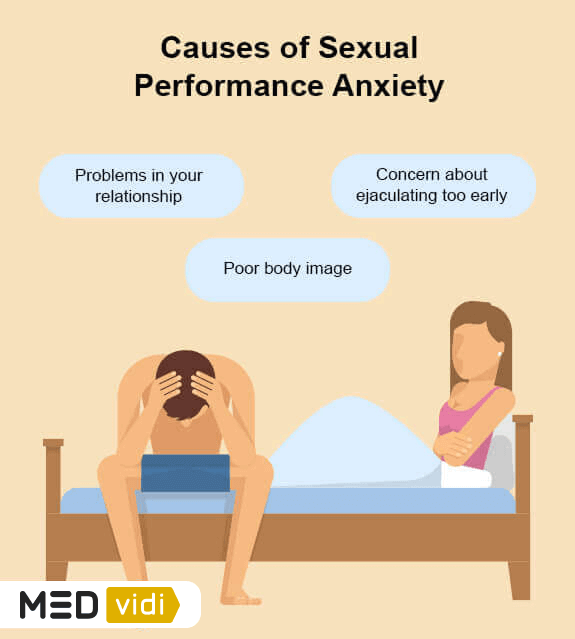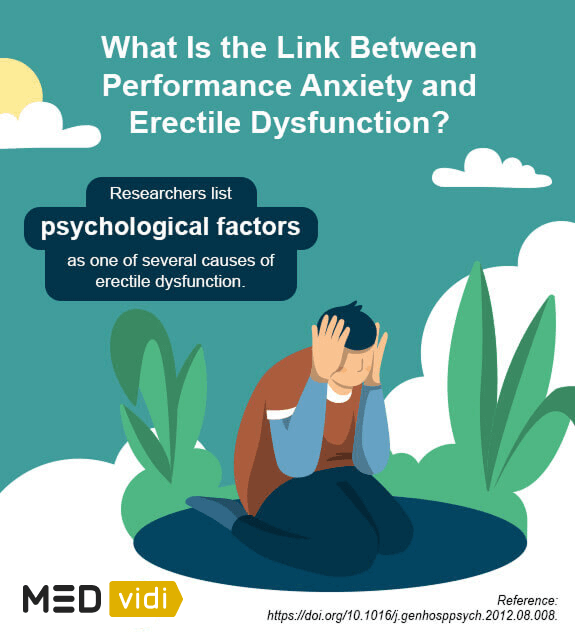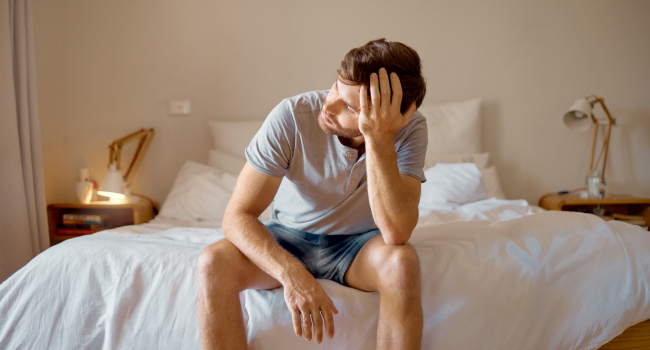Highlights
- Sexual performance anxiety involves intense worry that often leads to difficulties with intimacy; it includes both physical and emotional signs.
- Both men and women can experience sexual performance anxiety; it can be caused by past negative experiences, body image concerns, relationship issues, health conditions, etc.
- Anxiety and negative thoughts can consequently affect performance, trapping a person in a cycle of anxious feelings about future experiences.
- Practical strategies for improving body image and managing stress can help, however, sometimes, professional treatment for anxiety may be needed.
Most of us have experienced sexual performance anxiety at some point or another. It’s normal to get nervous before sex. You may have felt nervous during the first sexual encounter with a new partner or after you’d been celibate for a while. But for many people, performance anxiety in sex can become an ongoing issue that affects their confidence, relationships, and ability to enjoy intimacy.
Sexual performance anxiety is more common than you might think, and research shows that it’s
But with the right treatment, you can get out of the cycle of sexual performance anxiety and start to enjoy sex again.
What Is Sexual Performance Anxiety?
Sexual performance anxiety isn’t an officially recognized condition, but it’s a common type of anxiety that many people of all genders experience. It’s sometimes related to other health conditions like erectile dysfunction (ED), but not always.
Sexual performance anxiety is when you have such intense worries about how you’ll perform sexually that it gets in the way of your actual performance. It’s almost like a form of stage fright during sex. You might feel so preoccupied with how you’re doing that you’re unable to enjoy the moment or connect with your partner. You might find yourself overthinking during sex and unable to stay present. It can affect both physical responses (like erection or arousal) and emotional ones, and make intimacy feel more like a challenge than a pleasurable experience.
Sexual anxiety is more than just the usual nervousness when having sex with a new partner. It can become an agonizing cycle that can make it impossible to enjoy sex. In the research, both men and women report performance anxiety as being
Signs and Symptoms of Sexual Performance Anxiety
Most sex anxiety symptoms are relevant for people of both biological sexes, for example:
- Inability to climax during sex
- Increased heart rate when expected to perform sexually
- Decreased interest in sex
- Unsettled stomach
- Sweating
- Avoiding sexual encounters due to anxiety
However, some symptoms differ, such as:
Erectile dysfunction[3] in men- Vaginal dryness and/or pain during sex in women
Causes of Sexual Performance Anxiety
There are so many factors, both biological and emotional, that can contribute to sexual performance anxiety. Some factors that can lead you to have worries about your sexual performance to begin with include:
- Erectile Dysfunction (ED): If you’ve experienced difficulty getting or maintaining an erection in the past, you might worry about it happening again — which can then make it more likely to happen.
- Anxiety Disorders: Generalized anxiety disorder can increase self-consciousness and fear of failure in intimate settings.
- Depression: Depression can lower libido and make it harder to enjoy sex, which can eventually lead to concerns about sexual performance.
- Medication side effects: Some medications may cause sexual side effects, including loss of libido.
- Negative Past Experiences: If you’ve been criticized or rejected during sex before, those memories can make you feel anxious in new encounters.
- Relationship Issues: If there’s unresolved conflict or emotional distance in your relationship, sex can feel more stressful than connecting.
- Body Image Concerns: Feeling insecure about your body can lead you to focus on how you look or sound during sex instead of being in the moment.

The Vicious Cycle of Performance Anxiety
Often, sexual performance anxiety is caused by a cycle of negative thoughts about your sexual performance. This can often get you locked into a never-ending cycle. When you’re overly worried about your sexual performance, then it may be difficult to be present during sex and focus on pleasing your partner. Because of your anxiety, you may actually not perform as well as you hoped during sex, which can make you feel even more nervous about it the next time — leading to a self-perpetuating cycle. For those struggling with ongoing worry or stress, online anxiety treatment at MEDvidi offers a convenient way to get expert help and gain practical tools to manage these patterns more effectively.
How Sexual Performance Anxiety Affects Relationships
Sexual anxiety isn’t just about your physical sex life or performance in bed — it can have significant impacts on your partnership. Sex isn’t the end-all for relationship satisfaction, but for many couples, it’s an important factor. When one partner struggles with sexual performance anxiety, it can lead not only to a less active sex life, but also to complex emotional reactions.
For example:
- Partners may blame themselves for changes in sexual activity; they might mistakenly believe that these problems are due to a lack of love or attraction.
- Partners may become resentful due to reduced sex life.
- The person with sexual performance anxiety could feel less confident both in the bedroom and in the relationship overall.
- Both partners can feel less connected with one another.
- Arguments and conflict could increase due to all of the above.

How to Overcome Sexual Performance Anxiety
Fortunately, you can break the cycle of sexual performance anxiety and learn to enjoy sex again. Some people may be able to overcome sex anxiety on their own, while others may need treatment.
Work on Strengthening Your Body Image
If you feel self-conscious about your body, it can keep you focused on whether or not your partner finds you attractive — which can get in the way of enjoying sex. To build a more positive relationship with your body, take time to repeatedly acknowledge the things you like about it. With time, you may start to feel more confident in your own skin, and that can ease some of the anxiety when you’re with a new partner.
Practice Stress Reduction Techniques
When you’re stressed about whether or not you can perform in the bedroom, it can keep you locked in the cycle of sexual performance anxiety. And chronic stress, in general, can affect your libido — for example, sometimes stress affects a man sexually by causing erectile dysfunction. It can be helpful to learn how to manage your stress levels in general, so that you have the skills to lower stress when it’s getting in the way of sexual performance.
Learn and practice evidence-based stress reduction techniques before you have sex so that you’re ready to use them when you need them. For example, progressive muscle relaxation or breathwork can help you feel more grounded and in your body — both of which make it easier to enjoy intimacy.
Get Educated
Feeling unsure about what’s “normal” in sex can make anxiety even worse. Educating yourself on sex, pleasure, anatomy, and communication can help you feel more confident and less worried about doing things “right.” You can talk to a healthcare provider or sex educator, read books about sex, or explore your own body to understand what feels good for you. Knowing how to communicate that with your partner can help prevent performance anxiety from building.

Get Treatment
Having some sexual performance anxiety, especially when you’re with a new partner, can be normal. But if this anxiety is regularly getting in the way of your sexual encounters, then you deserve support and sexual performance anxiety treatment.
Sexual performance anxiety can be treated with therapy and, in some cases, medication.
Sometimes,

Conclusion
Performance anxiety is common, and it can happen to anyone. It can be understandably frustrating dealing with sexual anxiety, especially when it gets in the way of intimacy — but it’s nothing to be ashamed about. The good news is that it can be managed and treated through a combination of lifestyle changes as well as professional support.
Frequently Asked Questions
Can sexual performance anxiety occur with one partner but not with another?
Yes, there are many reasons why you might be nervous before sex with one person but not another. It can be sexual performance anxiety with a new partner or the consequence of having negative experiences, among other reasons. If you have difficulty identifying the causes of your anxiety, consult a healthcare provider.
How can you distinguish sexual performance anxiety from physical issues like erectile dysfunction or vaginismus?
Having specific physical issues can greatly increase your risk for sexual performance anxiety. They often come together, so it’s important to see a healthcare provider to have an assessment and get individualized recommendations for sexual anxiety treatment.
How can I talk about sexual performance anxiety with my partner without damaging our intimacy?
If it’s difficult for you to find ways to communicate with your partner about sexual performance anxiety, couples counseling may help.
What is the relationship between sexual performance anxiety and depression or generalized anxiety disorder?
Sexual performance anxiety is a common experience shared by many people. Sometimes, the underlying reason for it is a mental health condition like depression or anxiety; in other cases, it occurs because of other reasons.













